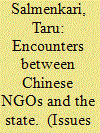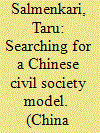| Srl | Item |
| 1 |
ID:
132780


|
|
|
|
|
| Publication |
2014.
|
| Summary/Abstract |
Researchers in the field of Chinese studies often assume that the ability of Chinese NGOs to operate freely increases with their distance from the government, and they classify NGOs accordingly. However, this study suggest that in China distance from the state is not a fixed characteristics of an organization nor is increased distance always an advantage. Even unregistered NGOs adopts various strategies that bring them close to the states. Forthermore, country to common expectations, independence does not guarantee that an NGO will adopt democratic decision-making structure or increase its contacts with ordinary citizens at the grassroots levels.
|
|
|
|
|
|
|
|
|
|
|
|
|
|
|
|
| 2 |
ID:
085318


|
|
|
| 3 |
ID:
085319


|
|
|
|
|
| Publication |
2008.
|
| Summary/Abstract |
This study hypothesizes that the Chinese state uses NGOs as objects of consultation for improving its policymaking in the same way it consults mass organizations, democratic parties, and official professional associations to obtain specialist information. This model of consultation is based on the mass-line model and on its application within democratic centralist administrative hierarchies. The investigation shows that, apart from their main social or environmental tasks, Chinese NGOs indeed inform the state, many of them with policy formulation in mind. It also shows that the Chinese state uses democratic centralist vocabulary to describe the tasks that it assumes NGOs should undertake. However, apart from the mass-line type of consultation, both NGOs and the state have other conceptions about the proper roles for NGOs. The state now promotes the idea of civil society as an independent service provider, while NGOs seek an even larger sphere of social autonomy and self-organization.
|
|
|
|
|
|
|
|
|
|
|
|
|
|
|
|
| 4 |
ID:
118929


|
|
|
|
|
| Publication |
2013.
|
| Summary/Abstract |
This paper critiques current academic usage of the analytic category of 'civil society' in recent studies of contemporary China. The problem is not the lack of good empirical work (which abounds), but rather the way in which understandings of 'civil society' as applied to China have remained insulated from wider theoretical debates emerging from other parts of the world which have queried the productive utility of these understandings. Specifically, recent studies of China continue to define civil society through its alleged autonomy from the state. This definition has led to unsettling discrepancies between theory and empirical knowledge about Chinese society. Moreover, it has caused researchers to pay little attention to the equally complicated question of whether there are sufficient horizontal linkages among various social actors to constitute a civil society in China in the first place. This paper will argue that lessons learned from the rich civil society tradition and scholarship from other parts of the world may be adapted fruitfully to generate more meaningful and nuanced analyses of Chinese associations.
|
|
|
|
|
|
|
|
|
|
|
|
|
|
|
|